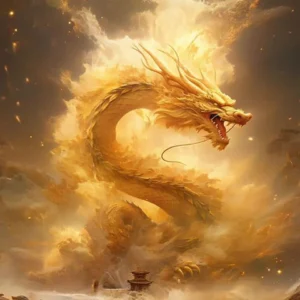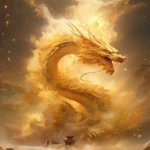

Chinese Dragons Symbolize? Discover the powerful symbolism
Dragons have captivated the human imagination for centuries, and nowhere is this fascination more pronounced than in Chinese culture. Unlike the fire-breathing, fearsome creatures of Western mythology, Chinese dragons symbolize a rich tapestry of meanings, embodying benevolence, power, and cultural pride. Let’s discover the symbols of power and wealth, among others, that characterize these majestic creatures.
Contents - The Majestic Chinese Dragon Symbolism
A Historical Perspective
To truly appreciate the significance of Chinese dragons, we must first delve into their historical roots. Chinese civilization dates back thousands of years, and throughout this long history, dragons have been at the forefront of cultural identity. The earliest recorded mentions of dragons in Chinese texts date back to the Shang Dynasty (1600-1046 BCE), where they were revered as symbols of water and agriculture.
According to ancient mythology, dragons were believed to possess the ability to control rain, rivers, and seas. As such, they were indispensable to agrarian societies, which relied on water for farming. This association with water illustrates one of the primary ways in which Chinese dragons symbolize life, fertility, and growth.
The Characteristics of Chinese Dragons
Chinese dragons are distinctly different from their Western counterparts. Often depicted as long, serpentine creatures with a sinuous body, they have four limbs and are adorned with vibrant scales. Their faces are typically characterized by a wide mouth, long whiskers, and a pair of antler-like horns. This unique appearance embodies a harmonious blend of various animal traits—often thought to represent the power and majesty of multiple creatures, from fish to tigers.
The chinese dragons symbolize meaning is layered and multifaceted. They are often associated with imperial authority, representing the emperor in traditional Chinese society. The dragon is a symbol of power and authority, often depicted in royal insignias and ceremonial items. It is said that the emperor was the “Son of the Dragon,” reinforcing the notion that chinese dragons symbolize divine right and governance.
Dragons Symbolize Luck and Prosperity
One of the most exciting aspects of Chinese dragons is their association with luck and prosperity. In Chinese culture, dragons are considered auspicious beings that bring good fortune. This belief is deeply ingrained in various cultural practices and festivities.
For instance, during the Chinese New Year celebrations, dragon dances are performed to chase away evil spirits and bring in prosperity for the coming year. These vibrant performances, accompanied by rhythmic drumming and music, create an exhilarating atmosphere filled with joy and hope. The dragon dance symbolizes the community’s collective aspirations for abundance and good luck, showcasing the deep-rooted belief that chinese dragons symbolize favorable outcomes.
The Dragon in Modern Culture
The influence of Chinese dragons extends beyond traditional practices and can be seen in modern culture as well. In films, literature, and art, dragons often represent not just power but also wisdom and protection. They are revered figures that guide heroes on their quests, embodying the idea that true strength comes from knowledge and benevolence.
Moreover, the dragon has transcended its historical roots to become a symbol of national pride. In contemporary China, the dragon is often used in branding and tourism, representing the rich heritage and cultural identity of the nation. From the Great Wall to the Forbidden City, chinese dragons symbolize a connection to the past and a celebration of Chinese achievements.
The Spiritual Dimension
In addition to their cultural significance, Chinese dragons also hold spiritual importance. In Taoism and Chinese folklore, dragons are seen as divine beings that connect the earthly realm with the heavens. They symbolize transformation and the cyclical nature of life, embodying the idea that change is an integral part of existence.
The concept of Yin and Yang, which represents balance and duality, is also intertwined with dragon symbolism. Dragons embody the Yang energy, symbolizing strength, assertiveness, and creativity, while their counterpart, the phoenix, embodies Yin energy, representing grace and harmony. Together, these two mythical creatures symbolize the balance of opposites, a foundational principle in Chinese philosophy.
The Dragon as a Guardian
In many Chinese homes and temples, you will find dragon motifs adorning architecture and decor. These dragon figures are not merely decorative; they serve a protective purpose. Dragons symbolize guardianship and are believed to ward off negative energies and evil spirits. The image of a dragon at the entrance of a building is thought to offer protection and ensure the safety of its inhabitants.
This guardian aspect of dragons is particularly evident during festivals and celebrations, where their presence is believed to bring peace and prosperity to the community. The image of the dragon as a protector underscores the excitement surrounding its symbolism—an embodiment of strength that shields against adversity.
Frequently Asked Questions About Chinese Dragon Symbolism
What do Chinese dragons symbolize?
Chinese dragons symbolize great power, good luck, strength, and authority. They are particularly associated with control over water, rainfall, typhoons, and floods. In Chinese culture, dragons are seen as auspicious beings that represent imperial power and a pioneering spirit.
Why are Chinese dragons considered auspicious?
Chinese dragons are viewed as auspicious because they embody positive qualities such as wisdom, protection, and prosperity. Their ability to control water is seen as vital for agriculture and survival, making Chinese dragons symbolize good fortune.
How do Chinese dragons differ from Western dragons?
Unlike Western dragons, which are often depicted as fire-breathing and malevolent creatures, Chinese dragons are seen as benevolent and protective. They symbolize kindness, warmth, and are revered in Chinese culture as bringers of good luck rather than harm.
What role do dragons play in Chinese mythology?
In Chinese mythology, dragons are often associated with various deities and are considered to be powerful guardians. They are also linked to the emperor, who was believed to be a descendant of dragons, symbolizing his divine right to rule.
What colors are associated with Chinese dragons, and what do they represent?
Different colors of dragons hold various meanings in Chinese culture. For example, a yellow dragon symbolizes the emperor and earth, while a black dragon represents water and wisdom. Each color can signify specific traits and powers.
What is the significance of the dragon in Chinese zodiac?
The dragon is one of the twelve animals in the Chinese zodiac and is associated with strength, success, and good fortune. Those born in the Year of the Dragon are believed to possess these attributes and are considered to be charismatic and ambitious.
Are there different types of Chinese dragons?
Yes, there are several types of dragons in Chinese culture, including the Lung (spiritual dragon), the Yinglong (winged dragon), and the Hualong (transforming dragon). Each type has its own symbolism and significance.
What do dragons symbolize in relation to emperors in Chinese history?
Chinese Dragons Symbolize the emperor’s divine authority and imperial power. They were often used in royal decorations and emblems to signify the emperor’s connection to celestial forces and his role as a ruler.
It’s clear that these magnificent creatures symbolize a wealth of meanings that resonate deeply within Chinese culture. From their historical significance as harbingers of rain and fertility to their modern representation of national pride and guardianship, dragons symbolize power, wisdom, and luck.
Whether you are captivated by the grandeur of dragon dances during festivals or inspired by their rich symbolism in art and literature, Chinese dragons continue to enchant and excite. They stand as a testament to the enduring legacy of a culture that reveres strength, prosperity, and the harmonious balance of life.
Did you like this article about “What do chinese dragons symbolize?“? You might be interested in this other one: Supreme Dragon God – Novel Chinese
Pingback: ¿Cómo sembrar la pepa de aguacate en casa? [Explicación] 01